Text
The importance of the online space for access to information.

This year, the global celebrations in Oxford, United Kingdom on 28 September 2023 will center around the theme of "the importance of the online space for access to information."
OPENING
Video presenting the International Day for Universal Access to Information (2 minutes)
Moderator: Mr James Deane, Co-founder of, and consultant to, the International Fund for Public Interest Media and former Director of Policy and Learning, BBC Media Action (UK)
Welcoming Remarks from Professor John Armour, incoming Dean of the Faculty of Law, University of Oxford
Opening Statement from Lord (Tariq) Ahmad of Wimbledon, Minister of State for the Middle East, North Africa, South Asia, Commonwealth and United Nations
Video Message from Ms Audrey Azoulay, Director-General of UNESCO
#28 september#unesco#access to information#right to access to information#accesstoinfoday#panel discussion
0 notes
Text
High-Level Roundtable: Guaranteeing Access to Information in the Age of the Internet.
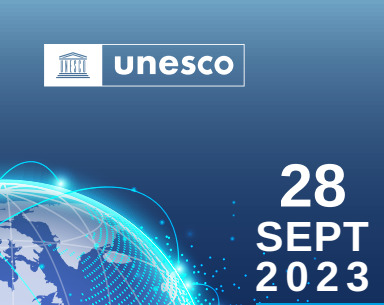
The high-level roundtable "Guaranteeing Access to Information in the Age of the Internet" will discuss access to information and internet shutdowns and restrictions in the context of the Vienna Declaration adopted at the World Conference on Human Rights, in 1993. It will call on effective access to the Internet and other digital technologies for the sake of ensuring fundamental human rights.
Moderator: Mr James Deane, Co-founder of, and consultant to, the International Fund for Public Interest Media and former Director of Policy and Learning, BBC Media Action (UK)
Speakers:
Mr Tawfik Jelassi, Assistant Director-General for Communication and Information (UNESCO)
Lord (Tariq) Ahmad of Wimbledon Minister of State (Middle East, North Africa, South Asia, Commonwealth and the UN) and the Prime Minister’s Special Representative on Preventing Sexual Violence in Conflict (UK)
Mr Joe Powell, Deputy Chief Executive Officer (Open Government Partnership)
Mr John Edwards, UK Information Commissioner (UK)
Ms Kate O'Regan, Director, Bonavero Institute of Human Rights of the University of Oxford (UK/South Africa)
Rapporteur: Ms Anjali Bhardwaj Sharma - National Campaign for Peoples’ Right to Information (India)
#internet shutdowns#28 september#unesco#panel discussion#internet restrictions#accesstoinfoday#righttoknow#right to access to information#round table
0 notes
Text
Technology for Democracy and Sustainable Development - Panel discussion I
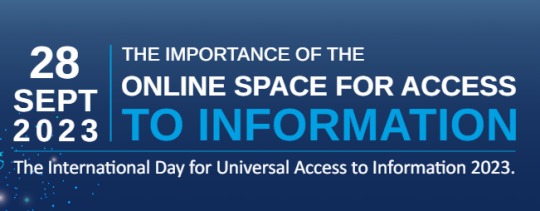
Panel 1 "Technology for Democracy and Sustainable Development" (in cooperation with Access Now and Freedom Online Coalition) will shed light on the complex dynamics and evolving landscape surrounding access to information in the digital era. This theme will encompass discussions on the challenges and opportunities posed by the internet, the significance of accessing information online, and the implications of internet shutdowns and online censorship.
Moderator: Ms Mahsa Alimardani, ARTICLE 19 and Oxford Internet Institute, University of Oxford (Iran/Canada)
Speakers:
Mr Kanbar Hossein Bor, Head of the Democratic Governance and Media Freedom Department at the Foreign, Commonwealth and Development Office (UK)
Mr Brett Solomon, Executive Director, Access Now (USA)
Mr Preetam Maloor, Head of the Emerging Technologies Division, International Telecommunication Union (ITU/online)
Ms Emilar Gandhi, Head of Stakeholder Engagement, Strategic Policy Initiatives at Meta (UK/Zimbabwe)
Mr Hilmi Ghalib, Executive Director, Yemeni Organization for Development & Technology (Yemen)
Rapporteur: Ms Ilaria Fevola, Legal Officer, ARTICLE 19 (Italy)
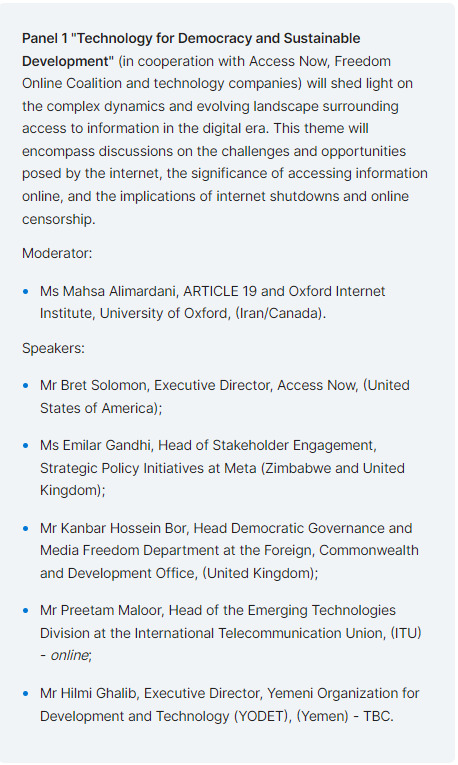
#Democracy#digitalgovernance#digitalisation#28 september#unesco#panel discussion#accesstoinfoday#righttoknow
0 notes
Text
The Official Ceremony of Signing the UNESCO-African Peer Review Mechanism (APRM) Memorandum of Understanding,
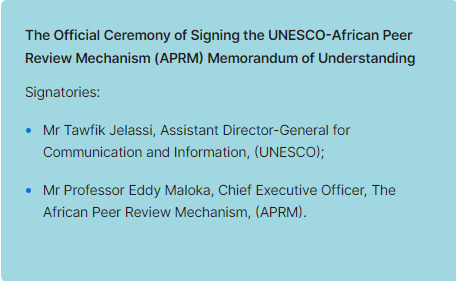
#Memorandum of Understanding#28 september#unesco#APRM#right to access to information#access to information
0 notes
Text
Internet connectivity as an enabler of the ability to exercise rights online, with a particular focus on access to information - Panel Discussion
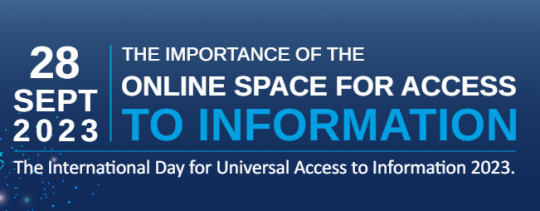
Panel 2 "Internet connectivity as an enabler of the ability to exercise rights online, with a particular focus on access to information" (in cooperation with Foianet and Article 19) will focus on the role of internet access in facilitating the exercise of rights online, and access to information. It will underscore the need for equal and unrestricted online access to foster open dialogue, diverses opinions, and the free flow of information.
Moderator: Mr. Toby Mendel, Chair, Freedom of Information Advocates Network (Canada)
Speakers:
Ms Quinn McKew, Executive Director, ARTICLE 19 (USA)
Ms Celeste Fernandez, Co-director, Civil Association for Equality and Justice (Argentina)
Mr Marcelo Daher, Human Rights Officer, United Nations (OHCHR)
Ms Mitali Mukherjee, Acting Director, Reuters Institute for the Study of Journalism, University of Oxford (UK/India)
Ms Emma Cantera, Lead on transparency and access to information, Public Governance Directorate (OECD)
Rapporteur: Mr Gilbert Sendugwa, Executive Director at Africa Freedom of Information Centre (Uganda)
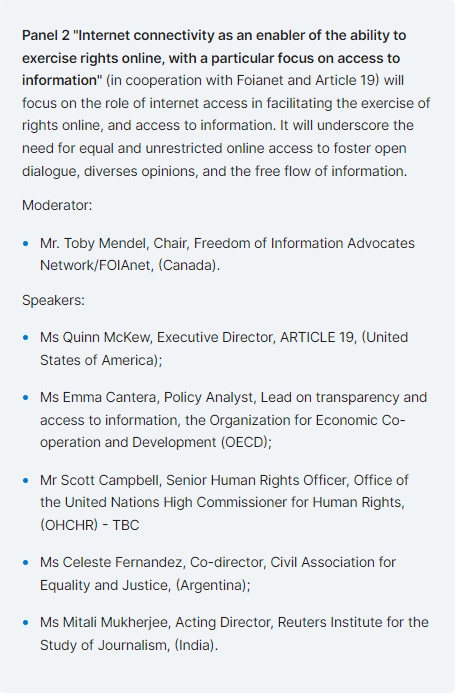
#28 september#unesco#right to access to information#access to information#accesstoinfoday#righttoknow#panel discussion
0 notes
Text
Judicial and Information regulators’ perspective on accessibility and Internet connectivity - Panel Discussion III
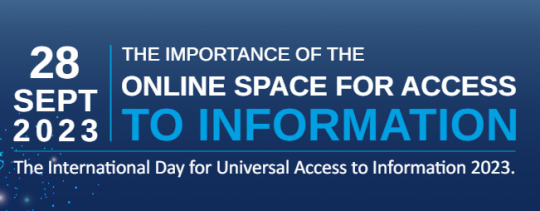
Panel 3 "Judicial and Information regulators’ perspective on accessibility and Internet connectivity" (in cooperation with the International Conference of Information Commissioners and representatives of the judiciary) will focus on the legal frameworks and mechanisms to promote transparency, accountability, and access to information. Experts perspective will highlight the importance of fostering a conducive environment for access to information, addressing challenges and promoting best practices.
Moderator: Ms Nicole Stremlau, rofessor of the University of Johannesburg and Head of the Comparative Media Law & Policy Program, Centre for Socio-Legal Studies of the University of Oxford (South Africa)
Speakers:
Ms Justice Atoki Dupe, Community Court of Justice of the Economic Community of West African States (Nigeria)
Ms Helena Jäderblom, Justice and President, Supreme Administrative Court (Sweden)
Ms Blanca Lilia Ibarra Cadena, On behalf of the International Conference of Information Commissioners and President of the National Institute for Transparency, Access to Information, and Personal Data Protection of México (Mexico)
Mr Ricardo C. Pérez Manrique, President, Inter-American Court of Human Rights (Costa Rica)
Ms Lucy N’dungu, Information Commissioner, Office of the Ombudsman of Kenya (Kenya)
Rapporteur: Mr Joan Barata, Senior Legal Fellow at Justitia - Future of Free Speech (Spain)
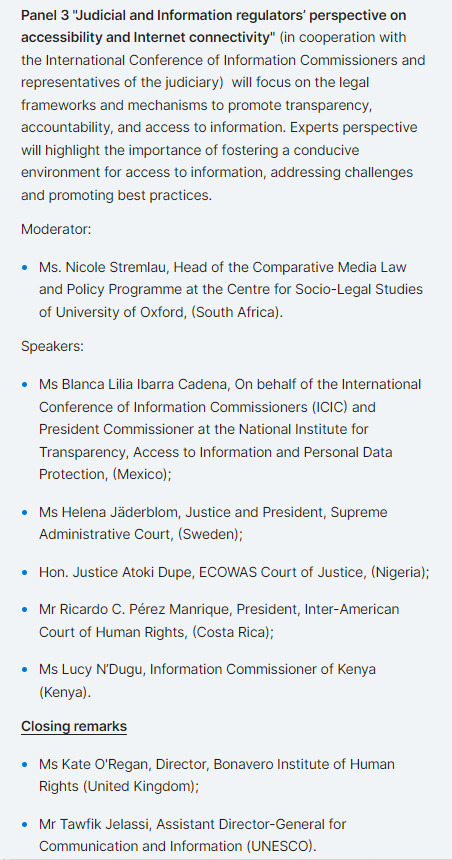
#28 september#unesco#artificialintelligence#right to access to information#access to information#righttoknow#accesstoinfoday#panel discussion
0 notes
Text
Internet Connectivity as an Enabler of the ability to Eercise Rights online, with a particular focus on Access to Information.
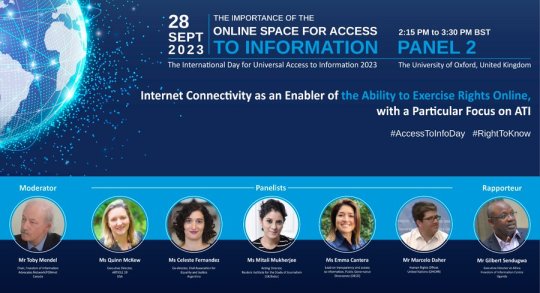
The International Day for Universal Access to Information 2023 is Thursday, September 28th; Join the UNESCO celebrations online or in person at Oxford.
#Internet Connectivity#28 september#right to access to information#access to information#accesstoinfoday#panel discussion#oxford university#unesco
0 notes
Text
Why do you think online spaces are important for access to information?
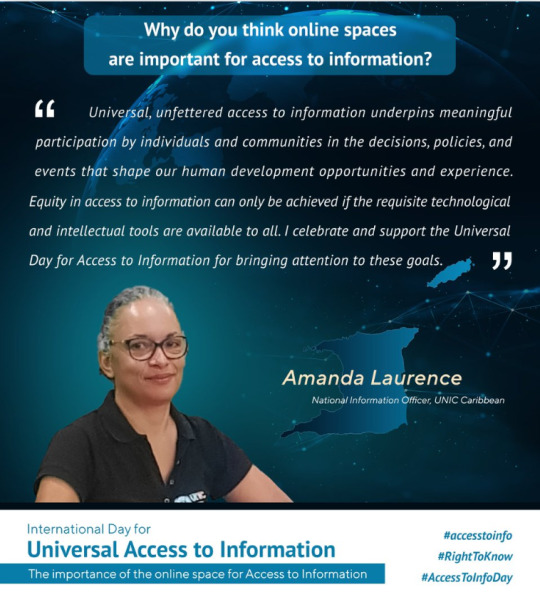
Embrace the digital age to strengthen our freedoms and foster social progress on International Day for Access to Information and beyond.
#InformationForRights#DigitalEmpowerment#AccessToInfo#RightToKnow#AccessToInfoDay#28 september#unesco caribbean#online spaces#digital age
0 notes
Text
How can internet-based & online information influence the ability of Thai citizens to exercise their democratic rights and to fully participate in civil society?
In recognition of International Day for Universal Access to Information (IDUAI), on 28 September, the online public forum will take stock of how internet-based and online information have influenced the ability of Thai citizens to exercise their democratic rights and to fully participate in civil society.
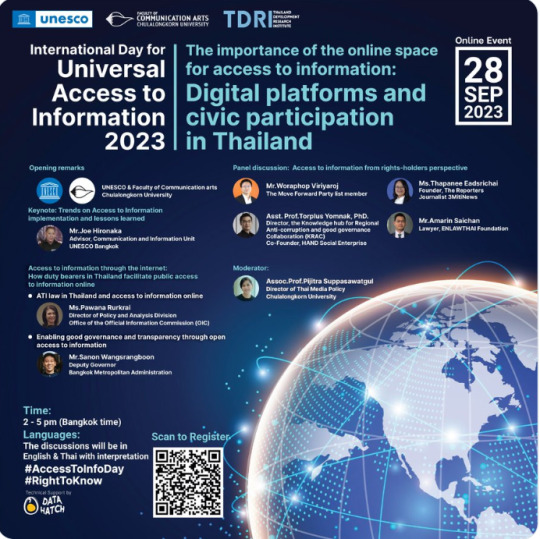
Join us online on #AccessToInfoDay on September 28th to learn more!
0 notes
Text
Access to information is a fundamental human right.
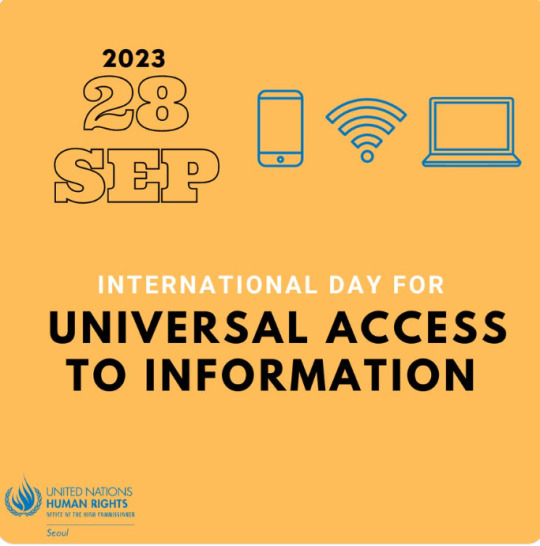
We must stop arresting and detaining citizens for merely seeking information, watching movies or listening to songs from outside the country.
0 notes
Text
Promote and uphold the fundamental right of the community to access government information.
The OAIC and other information commissioners and ombudsmen from across Australia join in our commitment to promote and uphold the fundamental right of the community to access government information. Read the OAIC joint statement.
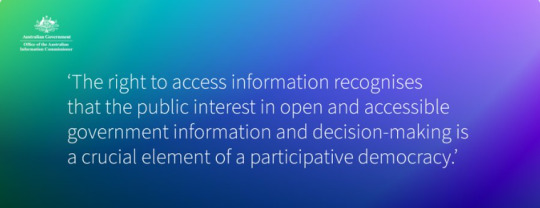
#information commissioners#australia#Office of the Australian Information commissioner#OAIC#digitalgovernance#Right to access to information#Joint statement
0 notes
Text
Everyone has the right to seek and receive verified information.
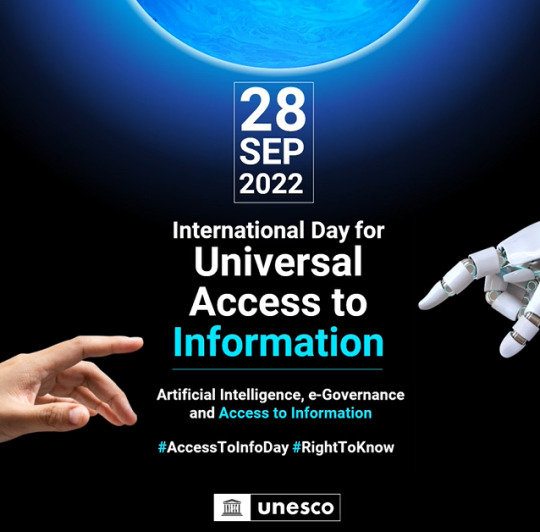
Fighting misinformation, disinformation and hate speech is key for sustainable development and human rights. U.N. Secretary-General on International Day for Universal Acess to Information 2022.
#campaign#digitalgovernance#artificialintelligence#International Day for Universal Access to Information#28 September#UNESCO#AccessToInfoDay#RightToKnox
0 notes
Text
The future of access to information; Ensuring complementarity between the right to information and personal data protection.
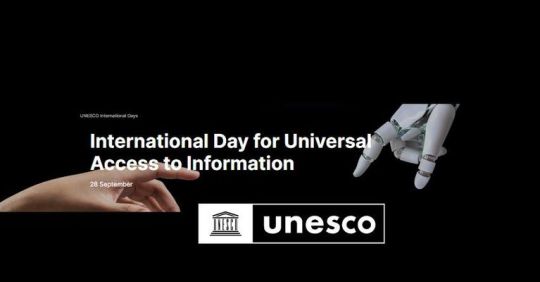
The OECD has played a significant role in promoting the importance of transparency – and access to information in particular – alongside the benefits of open government more broadly. At the same time, personal data protection and privacy are fundamental values which must continue to be protected by governments as they embrace the digital transformation and collect and store ever-vaster amounts of data. In this regard, emerging challenges for public administrations in taking a balanced approach to access to information and personal data protection have become evident in recent years and ensuring that neither are unduly restricted.
It is within this context that, increasingly, the institutional oversight bodies responsible for these policy areas are identifying synergies in safeguarding both interconnected rights. Although both are treated as separate legal frameworks in most countries and require different technical capacities and training, recognised complementarities are pushing governments to consider centralising these areas through a single institution. While not necessary, this dual responsibility can allow institutions to recognise and exploit connections between both policy areas and ensure that personal data and privacy are defended while still enabling full access to public information.
This panel will focus on the linkages and tensions between access to information and personal data protection and discuss how public bodies can better understand them and find ways to enhance – rather than limit – both rights.
#digitalgovernance#artificialintelligence#International Day for Universal Access to Information#28 September#UNESCO#digitalisation#emergingtechnologies
0 notes
Text
AI and frontier technologies for Open Educational Resources (OER).
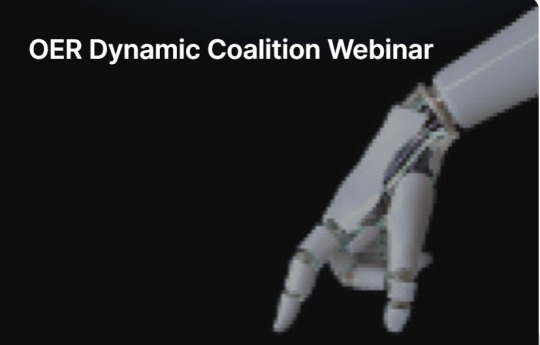
This OER Dynamic Coalition webinar joins the celebration of International Access to Information Day that this year is focussed on ‘ArtificialIntelligence, e-Governance and Access to Information’ and will explore AI and frontier technologies for Open Educational Resources (OER) and the potential of OER to contribute to accessing information to build back better.
During the 40th session of the UNESCO General Conference in 2019, UNESCO Member States adopted the UNESCO OER Recommendation, the only existing normative instrument in the area of technologies and education, calling on the Member States to undertake actions in five areas: (i) building capacity of stakeholders to create, access, re-use, adapt and redistribute OER; (ii) developing supportive policy; (iii) encouraging inclusive and equitable quality OER; (iv) nurturing the creation of sustainability models for OER, and (v) facilitating international cooperation.
The OER Dynamic Coalition was established further to the adoption of the UNESCO OER Recommendation by Member States at the 40th Session of the UNESCO General Conference in November 2019. The objective of the Dynamic Coalition is to support governments in implementing the OER Recommendation by promoting and reinforcing international and regional cooperation among all stakeholders in the first four areas of the UNESCO OER Recommendation.
In this perspective, in order to join the celebration of the International Day for Universal Access to Information (IDUAI) , UNESCO is organising a webinar on the works followed by the OER Dynamic Coalition. The objective of the webinar is to provide an overview of AI and frontier technologies for Open Educational Resources (OER) and the potential of OER to contribute to accessing information to build back better.
#digitalgovernance#artificialintelligence#International Day for Universal Access to Information#28 September#UNESCO#digitalisation#emergingtechnologies
0 notes
Text
Presentation of Online Training Tool on Access to Information.
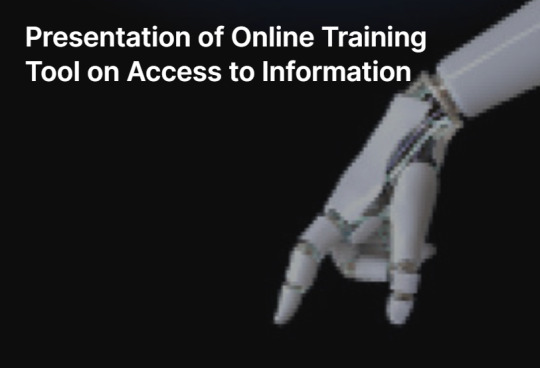
The 7th panel discussion will present the online training tool on Access to Information Laws and Policies and their Implementation, looking at how to access information held by public authorities.
Implementing laws giving individuals a right to access information held by public authorities, or right to information laws, is complex whether viewed from the perspective of those supplying information – i.e. public officials – or those demanding it – i.e. civil society, journalists, academics and ordinary citizens. To help both officials and requesters better understand how to implement right to information laws, UNESCO and the Centre for Democracy and Rule of Law (CLD) have developed a self-paced online course, titled Access to Information Laws and Policies and their Implementation. This session will introduce the course, outline the benefits of taking it and give a taste of what is included in it.
How can this training be rolled out in your region;
Whom should the course target in your country;
How can the training course be integrated into already existing training initiatives.
#digitalgovernance#artificialintelligence#International Day for Universal Access to Information#28 September#UNESCO#digitalisation#emergingtechnologies
0 notes
Text
Implementation of the UNESCO Open Data guidelines in support of transparency, innovation and e-governance.
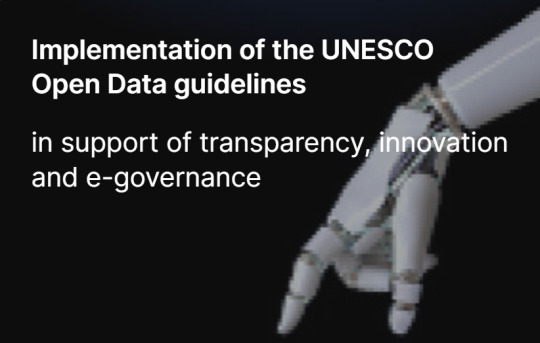
The 6th panel discussion will outlines concrete steps in the preparation, opening and follow-up for reuse of data. The speakers will review the guidelines during the session, and the audience will be invited to provide its remarks.
-What are the stumbling blocks that governments encounter in opening data for the public good?
-What can governments do to open data for reuse and sustainability of e-governance services?
-What monitoring mechanisms should be put in place to assure the openness of data?
-How can the Guidelines be implemented?
#digitalgovernance#artificialintelligence#International Day for Universal Access to Information#28 September#UNESCO#digitalisation#emergingtechnologies
0 notes
Text
Presentation of the updated Policy Guidelines for the Development and Promotion of Governmental Public Domain Information.
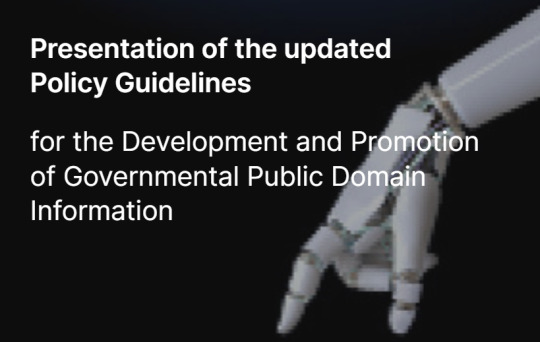
The 5th panel discussion will scrutinize regional perspectives from the previous IDUAI and the UNESCO Policy Guide on Access to Information before to discuss regional specificities and new challenges related to digitalization on implementing the right to information.
The reviewer of the Guidelines, Mr. Bouchaib Bounabat, will report back his input which contributed to an updated version of the UNESCO Policy Guidelines for the Development and Promotion of Governmental Public Domain Information.
-What enabling environment is necessary for #Access2Information in digital format to flourish?
-What are the necessary steps to develop and promote public access to information?
-How can one balance the Right to Access to Information and other rights in the digital age?
-How can the Guidelines be implemented?
#digitalgovernance#artificialintelligence#International Day for Universal Access to Information#28 September#UNESCO#digitalisation#emergingtechnologies
0 notes